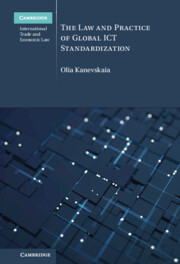Book contents
- The Law and Practice of Global ICT Standardization
- Cambridge International Trade and Economic Law
- The Law and Practice of Global ICT Standardization
- Copyright page
- Dedication
- Contents
- Tables
- Table of Cases
- Abbreviations
- Introduction
- Part I The Ecosystem of ICT Standardization
- Part II The Law of ICT Standardization
- Part III Governance Architecture and Decision-Making Process of SDOs
- Part IV Due Process in ICT Standardization
- 10 Case Studies on Dispute Resolution in SDOs
- 11 Tendencies and Best Practices in the Industry
- 12 Revisiting the Legitimacy of ICT Standardization
- Conclusion
- Annex I List of Interviews
- Bibliography
- Index
11 - Tendencies and Best Practices in the Industry
from Part IV - Due Process in ICT Standardization
Published online by Cambridge University Press: 09 February 2023
- The Law and Practice of Global ICT Standardization
- Cambridge International Trade and Economic Law
- The Law and Practice of Global ICT Standardization
- Copyright page
- Dedication
- Contents
- Tables
- Table of Cases
- Abbreviations
- Introduction
- Part I The Ecosystem of ICT Standardization
- Part II The Law of ICT Standardization
- Part III Governance Architecture and Decision-Making Process of SDOs
- Part IV Due Process in ICT Standardization
- 10 Case Studies on Dispute Resolution in SDOs
- 11 Tendencies and Best Practices in the Industry
- 12 Revisiting the Legitimacy of ICT Standardization
- Conclusion
- Annex I List of Interviews
- Bibliography
- Index
Summary
This chapter reveals experiences of individuals who have been involved in ICT standardization, mostly experts from leading private companies, with the processes of different standards development organizations (SDOs), discussing such aspects as practical relevance of IPR policies, dispute resolution by the organizations’ governance bodies, and the differences between drafting organizational policies and drafting standards. In particular, this chapter seeks to understand from a practical viewpoint, how compliance with due process requirements by SDOs relates to the effectiveness of their standards and, building on these findings, reveal the limits of epistemic legitimacy in ICT standardization as a regulatory tool. The main conclusion from this qualitative empirical research is that, according to the experts, the ICT standardization ecosystem functions well and does not need any interference from the public sector. As such, while the findings of this chapter take a form of anecdotal evidence, they increase our understanding of current practices in ICT standardization, and offer food for thought for both public and private regulators with respect to the design and scrutiny of standardization processes.
Keywords
- Type
- Chapter
- Information
- The Law and Practice of Global ICT Standardization , pp. 257 - 290Publisher: Cambridge University PressPrint publication year: 2023

